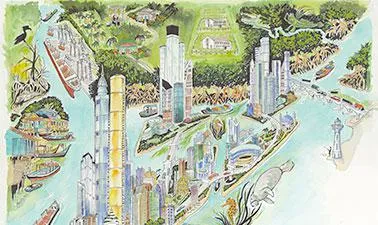
Socially-Responsible Real Estate Development 
This course explores the tools of social impact assessment (SIA), environmental impact assessment (EIA), and public consultation to determine if a proposed real estate development project is socially responsible. It provides guidance on how to assess the potential impacts of a project and how to ensure that the public is consulted. ▼
ADVERTISEMENT
Course Feature
![]() Cost:
Cost:
Free
![]() Provider:
Provider:
Edx
![]() Certificate:
Certificate:
No Information
![]() Language:
Language:
English
![]() Start Date:
Start Date:
Self paced
Course Overview
❗The content presented here is sourced directly from Edx platform. For comprehensive course details, including enrollment information, simply click on the 'Go to class' link on our website.
Updated in [March 06th, 2023]
This course, Socially-Responsible Real Estate Development, provides students with the opportunity to learn how to evaluate a development project and practice socially responsible real estate. The professor, with more than forty-five years of teaching experience at MIT, will use an applied case study method to teach students how to use social impact assessment (SIA), environmental impact assessment (EIA), and public consultation effectively. Through this course, students will gain an understanding of what constitutes socially responsible real estate development and how to apply SIA, EIA, and stakeholder engagement to create socially-responsible real estate development throughout the world.
[Applications]
Upon completion of this course, students should be able to apply the tools of social impact assessment (SIA), environmental impact assessment (EIA), and public consultation to evaluate proposed real estate development projects. They should also be able to develop their own personal theory of what constitutes socially responsible real estate development. Additionally, students should be able to use the case study method to open new opportunities for real estate developers and urban planners to create socially-responsible real estate development throughout the world.
[Career Paths]
1. Real Estate Developer: Real estate developers are responsible for the planning, design, and construction of residential and commercial properties. They must be knowledgeable in the areas of finance, law, and construction, and must be able to work with a variety of stakeholders to ensure the successful completion of projects. As the demand for socially-responsible real estate development increases, real estate developers must be able to apply the principles of SIA, EIA, and public consultation to their projects.
2. Urban Planner: Urban planners are responsible for the development of cities and towns. They must be knowledgeable in the areas of land use, transportation, and environmental planning, and must be able to work with a variety of stakeholders to ensure the successful completion of projects. As the demand for socially-responsible real estate development increases, urban planners must be able to apply the principles of SIA, EIA, and public consultation to their projects.
3. Sustainability Consultant: Sustainability consultants are responsible for helping organizations and businesses develop and implement sustainable practices. They must be knowledgeable in the areas of environmental science, energy efficiency, and renewable energy, and must be able to work with a variety of stakeholders to ensure the successful completion of projects. As the demand for socially-responsible real estate development increases, sustainability consultants must be able to apply the principles of SIA, EIA, and public consultation to their projects.
4. Social Impact Analyst: Social impact analysts are responsible for assessing the social and environmental impacts of development projects. They must be knowledgeable in the areas of economics, sociology, and environmental science, and must be able to work with a variety of stakeholders to ensure the successful completion of projects. As the demand for socially-responsible real estate development increases, social impact analysts must be able to apply the principles of SIA, EIA, and public consultation to their projects.
[Education Paths]
1. Bachelor of Science in Real Estate Development: This degree program provides students with the knowledge and skills necessary to become successful real estate developers. Students learn about the legal, financial, and economic aspects of real estate development, as well as the principles of urban planning and design. The degree also covers topics such as sustainability, social responsibility, and public consultation. As the demand for socially responsible real estate development increases, this degree program is becoming increasingly popular.
2. Master of Science in Urban Planning: This degree program focuses on the planning and design of urban areas. Students learn about the principles of urban design, land use planning, and public policy. They also gain an understanding of the social, economic, and environmental impacts of urban development. This degree program is ideal for those interested in pursuing a career in urban planning and real estate development, as it provides the skills and knowledge necessary to create socially responsible projects.
3. Master of Science in Sustainable Development: This degree program focuses on the principles of sustainable development, including environmental protection, social justice, and economic development. Students learn about the principles of sustainable development, as well as the tools and techniques used to create sustainable projects. This degree program is ideal for those interested in pursuing a career in sustainable development and real estate development, as it provides the skills and knowledge necessary to create socially responsible projects.
4. Doctor of Philosophy in Real Estate Development: This degree program focuses on the research and analysis of real estate development projects. Students learn about the principles of real estate development, as well as the tools and techniques used to create socially responsible projects. This degree program is ideal for those interested in pursuing a career in research and analysis of real estate development projects, as it provides the skills and knowledge necessary to create socially responsible projects.
Course Provider

Provider Edx's Stats at AZClass
Socially-Responsible Real Estate Development explores social impact assessments, environmental impact assessments, and public consultation tools to determine whether a proposed real estate development is socially responsible. Learners can take this course to learn how to evaluate development projects and practice socially responsible real estate. They will learn about the tools of social impact assessment, environmental impact assessment and public consultation and how they can be applied to development projects. They will also learn how to develop their own personal theory of what socially responsible property development is.
Discussion and Reviews
0.0 (Based on 0 reviews)
Explore Similar Online Courses

PowerPoint for Complete Beginners (PowerPoint 2016)

Graphic Design - David Carson

Python for Informatics: Exploring Information

Social Network Analysis

Introduction to Systematic Review and Meta-Analysis

The Analytics Edge

DCO042 - Python For Informatics

Causal Diagrams: Draw Your Assumptions Before Your Conclusions

Whole genome sequencing of bacterial genomes - tools and applications

Warren Buffett: Why Real Estate Is a LOUSY Investment?

Real Estate Exam Prep


Start your review of Socially-Responsible Real Estate Development